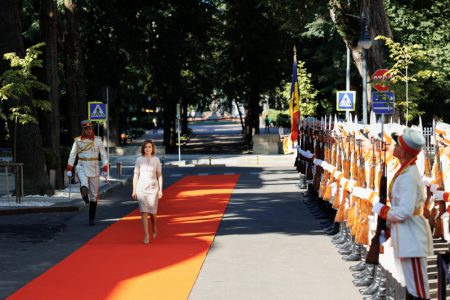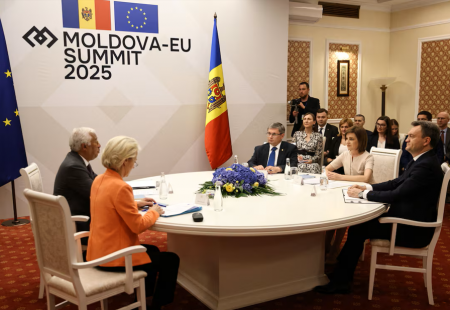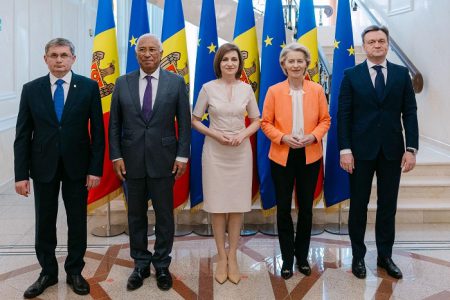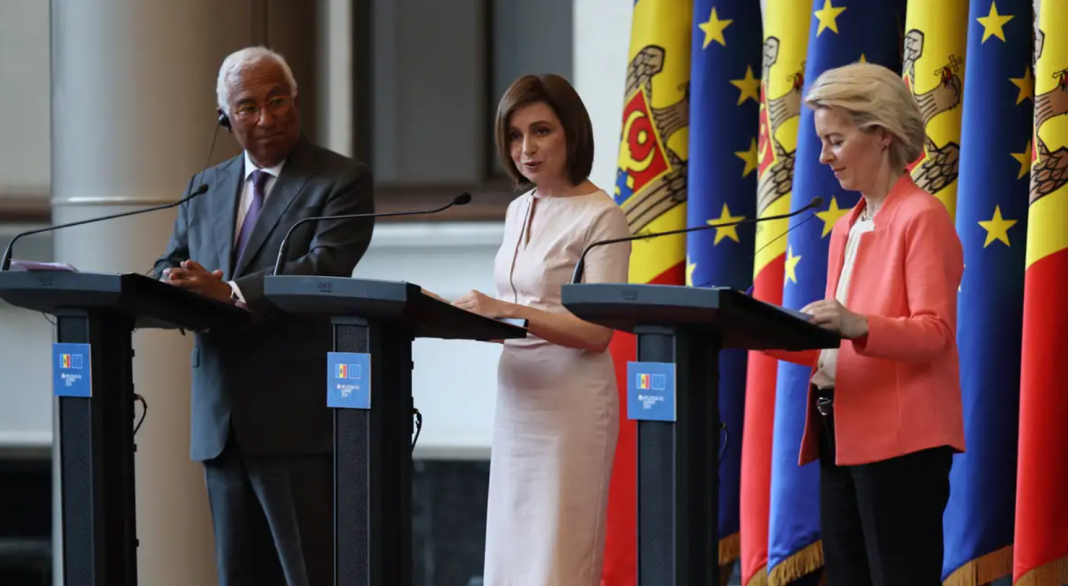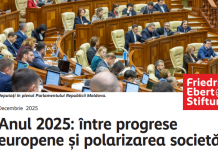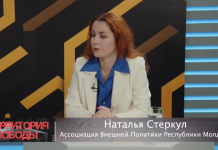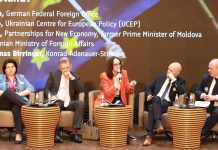Mihaela Mihai,
Asociația pentru Politica Externă (APE)
The Moldova-EU Summit held on July 4, 2025, in Chișinău marked a historic milestone in the relationship between the Republic of Moldova and the European Union. For the first time, a bilateral summit of this kind took place, symbolizing Moldova’s irreversible path toward EU membership and the deepening of political, economic, and social ties between the two parties. The event was attended by Moldova’s highest officials, including President Maia Sandu, as well as top representatives from the European Union, such as European Council President António Costa and European Commission President Ursula von der Leyen. The summit’s outcomes were substantial, reflecting both the EU’s strong commitment to Moldova’s European aspirations and the country’s determination to advance reforms and align with European standards.
EU and Moldovan leaders explicitly called this the first bilateral summit of its kind in Chişinău, intended to become a regular platform for dialogue. President Maia Sandu said: “it demonstrated that Moldova is now being seen as a natural part of the European family”. This landmark meeting was hailed as a “milestone” in EU–Moldovan relations. It underscored the bloc’s strong political support for Moldova’s EU membership path. Summit leaders issued a Joint Declaration reaffirming that “the future of Moldova and its citizens lies within the European Union” .
A central theme of the summit was Moldova’s constitutional commitment to EU membership, following the 2024 referendum that enshrined this objective in the country’s fundamental law. The EU recognized Moldova’s progress in implementing reforms and welcomed the start of legislative screening as well as the intention to open negotiation clusters as soon as the necessary conditions are met. This political momentum was reinforced by a shared emphasis on democratic values, sovereignty, and the principle that Moldova’s future must be decided freely by its citizens, without external interference. The summit also strongly condemned Russia’s war of aggression against Ukraine and the persistent hybrid threats targeting Moldova’s democracy and stability.
Security and defense cooperation featured prominently in the summit’s agenda. The EU and Moldova agreed to strengthen their collaboration within the frameworks of the Common Foreign and Security Policy and the Common Security and Defence Policy. Moldova committed to increasing its contributions to EU missions and operations, while the EU pledged continued support for the modernization of Moldova’s defense capacities, including a €60 million allocation from the European Peace Facility in 2025. The EU reaffirmed its assistance in countering hybrid and cyber threats, providing rapid response teams and strategic communication support. Additionally, the summit acknowledged Moldova’s progress in judicial reform, particularly in strengthening judicial independence and fighting corruption, with the EU promising continued support for the consolidation of the rule of law.
Economic and financial support was another cornerstone of the summit’s results. The European Commission announced the release of the first €270 million installment from the €1.9 billion Growth Plan for Moldova, the largest EU financial package ever allocated to the country. This funding aims to accelerate reforms, stimulate sustainable development, create jobs, and prepare Moldova for integration into the EU Single Market. The EU remains Moldova’s largest trading partner, and both sides reaffirmed the importance of the Deep and Comprehensive Free Trade Area. Temporary trade liberalization measures have already boosted Moldovan exports, and the transition to permanent reciprocal trade liberalization is underway. Infrastructure and connectivity projects were also highlighted, including the completion of the 400 kV Vulcanesti-Chișinău power line by the end of 2025, with EU support for energy market reforms and eco-voucher programs to reduce energy bills. Moldova and the EU will also cooperate on integrating Moldova into the Single European Railway Area and developing EU-standard gauge railway infrastructure.
Social, educational, and people-to-people initiatives were a further focus of the summit. Moldova became the first non-EU country to sign a Cooperation Agreement with the European Labour Authority, launching a high-level dialogue on labor, skills, education, and social policies. The EU supports Moldova’s participation in programs such as Erasmus+ and Creative Europe, and the launch of WIFI4Moldova will provide free public Wi-Fi in disadvantaged areas. The summit welcomed Moldova’s efforts to expand opportunities for youth, strengthen social cohesion, and gradually participate in relevant EU programs and policies. Moldova will also launch a pilot program inspired by the EU School Fruit, Vegetable, and Milk Scheme, with EU support for accession to Creative Europe and Erasmus+.
Energy security and digital transformation were also addressed. The EU will continue to provide technical assistance for energy market reforms, support the increase of local renewable energy capacity, and help Moldova reduce its dependence on Russian energy supplies. Moldova’s integration into the EU energy market and the implementation of the Energy Community acquis remain priorities. By October 2025, Moldova will join the Single Euro Payments Area, enabling faster and cheaper euro transfers for citizens and businesses. The EU supports Moldova’s ambition to join the EU’s Roam Like at Home area starting January 2026, subject to a positive evaluation. The launch of WIFI4Moldova and support for digital services and cybersecurity are key elements of the country’s digital transformation agenda.
The EU pledged to strengthen border control cooperation. The Council’s background note emphasizes assistance in border management to prevent illegal flows. The Joint Declaration welcomed Moldova’s progress combating organised crime – arms, drugs, migrant smuggling and human trafficking – and promised continued cooperation with EU agencies like Europol. This is crucial given concerns about illicit networks potentially tied to external destabilisation efforts.
Regional security and Moldova’s sovereignty were reaffirmed, with both sides calling for the withdrawal of all Russian military forces and munitions from the Transnistrian region. Moldova and the EU are cooperating more closely than ever, both politically and economically, in the face of escalating threats to regional security caused by Russia’s unjustified and unprovoked war of aggression against Ukraine. The summit sent a strong political signal of European solidarity with Moldova, countering disinformation and supporting the country’s resilience against external pressures.
In conclusion, the July 4, 2025, Moldova-EU Summit stands as a turning point in Moldova’s European integration. The event not only reaffirmed the country’s European future but also brought concrete financial, political, and social benefits. The summit’s outcomes ranging from accelerated accession negotiations and major financial support to enhanced security cooperation and social initiatives demonstrate the EU’s unwavering commitment to Moldova’s transformation and resilience. For Moldovan citizens, these results mean greater economic opportunities, improved infrastructure, enhanced security, and a stronger voice in Europe. The summit also serves as a powerful counter to disinformation and external pressures, reinforcing Moldova’s sovereignty and democratic values. As Moldova continues on its path toward EU membership, the deliverables from this summit will play a crucial role in shaping the country’s future and ensuring lasting prosperity and stability for all its people.
The opinions expressed in this article are those of the author and do not necessarily reflect the views of the Foreign Policy Association.
Joint Declaration following the first EU-Republic of Moldova Summit:
https://ec.europa.eu/commission/presscorner/detail/en/statement_25_1740
https://presedinte.md/rom/presa/declaratie-comuna-a-primului-summit-republica-moldova-uniunea-europeana
